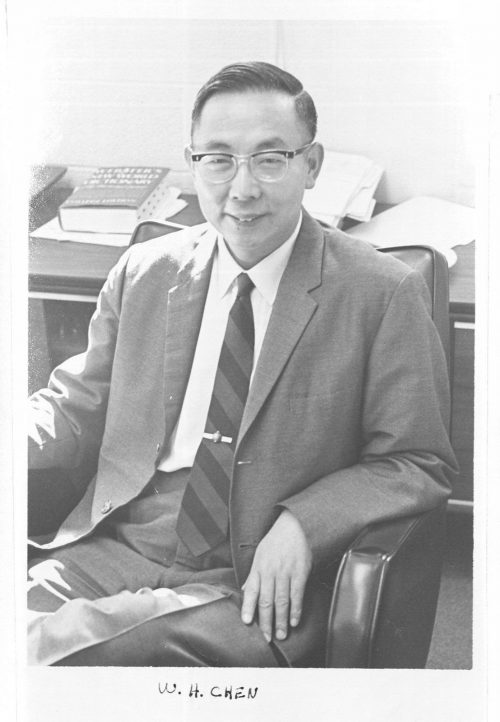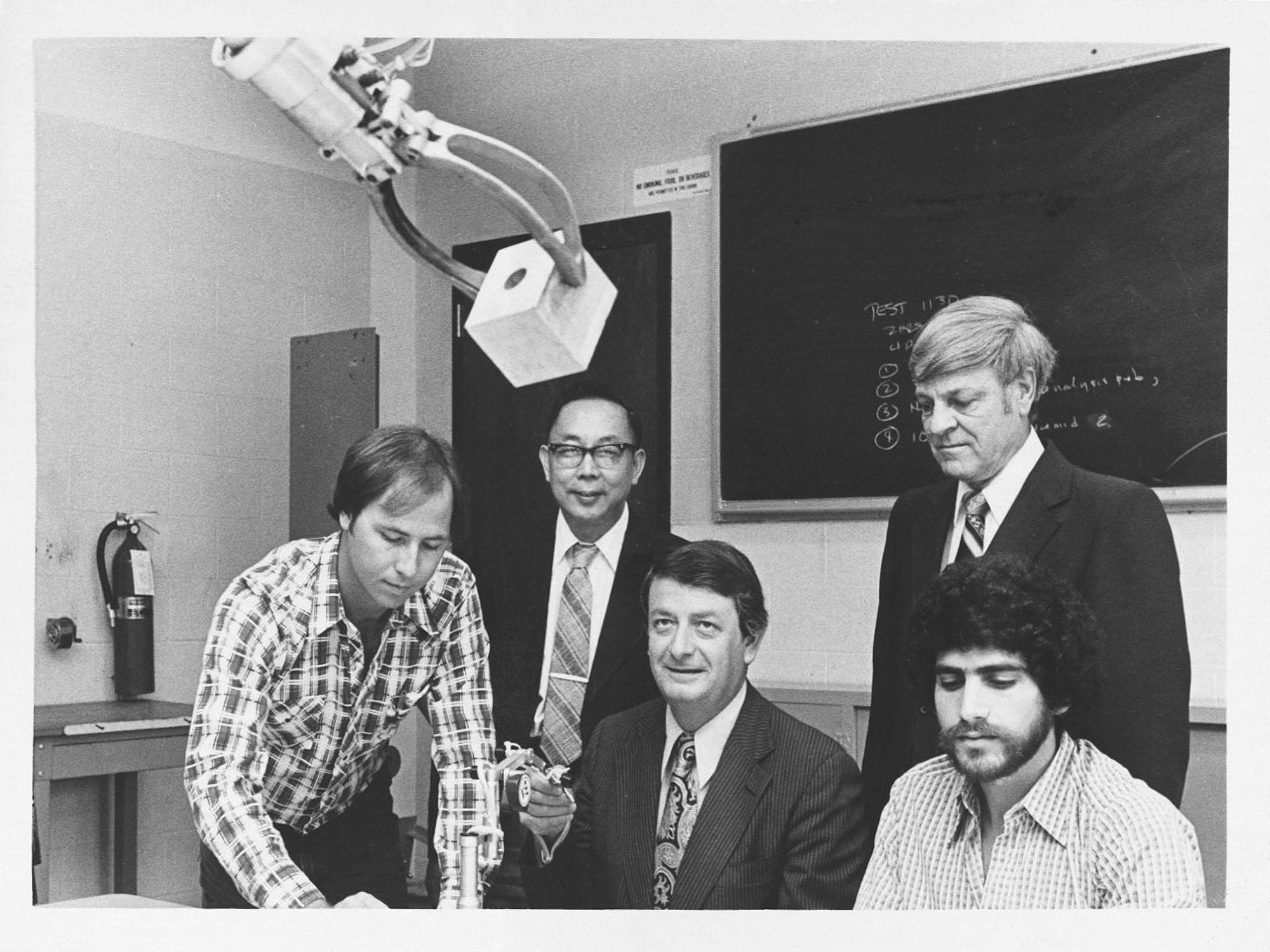A legacy of purpose: shaping who we are and why we matter

Wayne Chen, Ph.D. was a pioneer who shaped the defining trajectory of the college with a lasting tradition of academic excellence and a commitment to service.
Chen started at the University of Florida in 1952 as an assistant professor and quickly rose to prominence through his visionary leadership and commitment to interdisciplinary innovation. By 1965, he had assumed dual roles as chair of the Department of Electrical Engineering and associate dean for research and innovation for the college while also teaching as the Reilly Professor of Aeronautics and Astronautics in material engineering. His appointment as the fifth dean of the College of Engineering by the State of Florida Board of Regents in 1973 marked the beginning of a transformative era that lasted until 1988.
The college flourished. Academic programs expanded significantly, and most notably, he led pioneering advancements in electronic distance learning, computer engineering and environmental engineering. Graduate student enrollment soared, and groundbreaking, interdisciplinary teaching and research thrived as innovation with global impact reached new heights. Chen’s tenure ushered in a new era defined by a rich culture of diversity, collaboration and service – a tradition that continues to define who and what Gator Engineers are today.
A pathfinder who firmly believed that academic excellence must be rooted in robust research with meaningful societal impact, Chen exemplified this philosophy through his own actions. As a scholar and servant at heart, he continued to author influential books and earn prestigious professional and community accolades throughout his tenure.
Truly a legacy of vision, innovation, and impact, Wayne’s World is a foundation that shaped the future of Gator Engineering.
Every engineer, everywhere, all at once
From 1973 to 1988, Chen elevated the college to national prominence, driving research expenditures from $4 million to $30 million and securing a ranking of 16th in national public higher education research. During this transformative era, UF pioneered the nation’s foremost engineering distance education program, GENESYS. Long before live video communication became commonplace, GENESYS, short for Graduate Engineering Education System utilized a revolutionary two-way live TV platform to connect students with professors in real-time, no matter their location. At its peak, it was the world’s largest educational television network, with stations in Melbourne, Orlando, Daytona Beach, and Cape Canaveral.
The demand was so great that the State leased land near Cape Kennedy to expand facilities. GENESYS not only trained countless engineers but also laid the foundation for modern distance learning. Today, its legacy lives on, with former GENESYS facilities serving SpaceX, Space Florida, and the Air Force Space and Missile History Center.
A tale of two catalysts – growth and access
Chen recognized that expanding and enriching the talent pool was essential to the college’s growth and success. His tenure saw student enrollment soared by 300%, with a notable increase in female students. The college proudly graduated its first female master’s student from the Department of Chemical Engineering. Chen’s commitment to student success did not stop with women, as students from underrepresented groups also thrived, further fostering the rich and creative spirit that continues to define our college today.
Personal Achievements
- Florida Blue Key Outstanding Faculty Award
- Tau Beta Pi Eminent Engineer Award
- UF Florida Teacher-Scholar Award
- IEEE Fellow Award
Bioglass: The World’s First Bone-Bonding Material
Invented as a groundbreaking composite, Bioglass continues to be used in orthopedic and orthodontic applications today.
Pioneering Targeted Cancer Treatment
Engineering faculty Jeanne Goldberg laid the foundation for targeted cancer treatment where drugs are delivered only at cancer tumors while sparing surrounding healthy tissues.
Pioneering Space Travel
Engineering faculty Rudolph Coleman’s groundbreaking ‘common futa’ mathematical formulation laid the foundation for modern spacecraft navigation, earning him IEEE’s highest honor, the Medal of Honor.
Father of the modern PC
Eminent faculty Vincent Atanasoff is widely recognized as the originator of today’s modern computer.
Dotting the ‘I’s and crossing the ‘T’s: Innovation, Interdisciplinary Collaboration, and Infrastructure for Tomorrow’s Talent
Chen believed in the transformative power of engineering to elevate society’s well-being. He understood that building healthy and sustainable communities required both immediate action today and visionary stewardship toward tomorrow. Guided by this belief, he championed applied engineering in critical areas, especially in health, the environment, and agriculture, while advancing exciting newly emergent technologies in computer, mechanical and energy engineering. What truly distinguished him was his visionary embrace of interdisciplinary research and holistic integration across diverse fields.
He forged strong collaborations with UF’s pre-med program, successfully integrating advanced health research and education with technological breakthroughs in biomedical engineering, laying the groundwork for innovations that improved healthcare diagnosis and treatment. Responding to the rising environmental challenges of the era, he prioritized conservation and sustainability by establishing new undergraduate degrees and launching initiatives focused on restoring ecosystems and advancing renewable energy. In agricultural engineering, he sought to safeguard Florida’s future by addressing critical issues such as water conservation and developing sustainable irrigation systems tailored to the region’s needs.
Chen’s vision also ushered in programs that harnessed emergent technologies to solve real-world problems. He launched interdisciplinary programs such as the Center for Microcomputers, which expanded computer engineering research and education during the dawn of the computing revolution. UF’s Transportation programs advanced smart traffic systems and sustainable urban planning, while the Innovative Nuclear Space Power and Propulsion Institute leveraged the newly built UF Nuclear Teaching Reactor, a 10,000-watt training reactor that served as the infrastructure backbone of the newly established Department of Nuclear Engineering. The Software Engineering Research Center laid the foundation for advancements in programming and systems design and perhaps most notably, Chen’s creation of the nation’s first robotics lab, the Center for Intelligent Machines and Robotics, was a pioneering initiative that shaped the future of automation and intelligent systems.
This new interdisciplinary approach also saw a major expansion of UF Engineering’s physical infrastructure, with the construction of the South Complex to house the electrical, aerospace, chemical, and environmental engineering departments and the North Complex for the mechanical and materials engineering departments. With construction complete, each of these disciplines moved into cutting-edge facilities designed to fuel collaboration and discovery.
For the greater good
Chen forged a legacy rooted in the belief that engineering must serve the greater good by delivering meaningful solutions. His vision ensured that individuals, society, and the global community alike would benefit from UF’s innovation. His visionary strategy of holistic integration firmly established the college as a hub for improving lives and safeguarding natural resources. By championing a human-centered, service-driven approach, he shaped not just what we achieve as Gator Engineers, but who we are and why our work matters. This enduring philosophy continues to define us as a force for positive, lasting change.

